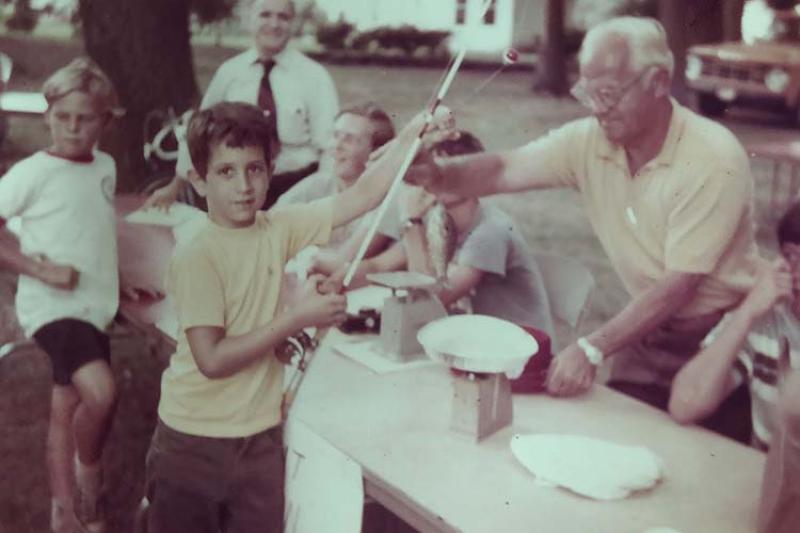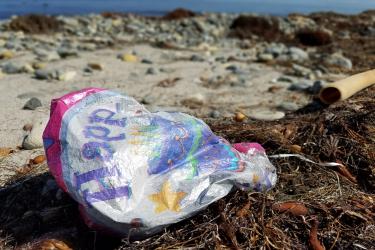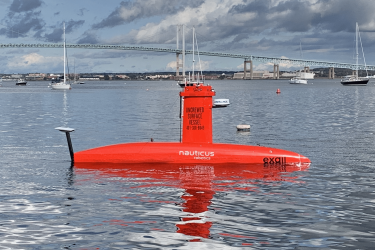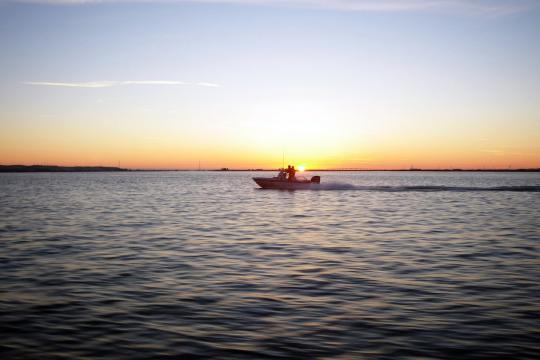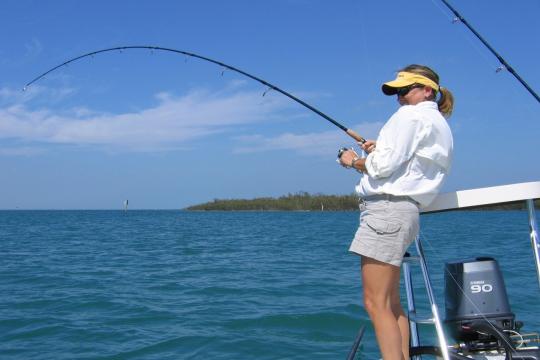What is your earliest fishing memory?
I grew up at the Jersey Shore, so fishing was all around me as a kid. My earliest fishing memory was entering a fishing contest when I was probably 6 years old. We fished in this little pond in Manasquan, New Jersey, and I won the contest for my age group. (Probably because I was the only kid who actually caught a fish.)
After we moved from Manasquan over to Point Pleasant, I spent a lot of time fishing at the Manasquan Inlet. My friends and I would ride our bikes to fish at the Point Pleasant Canal. With just a simple spoon, we could do pretty well fishing for bluefish, which I would bring home and my mom would grill up with tomatoes, lemon, and bacon. I also had a few crab traps and we’d ride our bikes down to the river beach, hop a fence, and catch a few blue crabs to bring home for dinner.
What is your favorite/proudest fishing memory?
While I was in college, I went to Myrtle Beach, South Carolina, with a bunch of friends to “recover” after finals. I convinced them to join me on a party boat for an afternoon. We caught coolers full of black sea bass that we took back to the rental house and had a massive Calabash-style fish fry that probably fed about 60 people.
How has your childhood fishing experiences influenced your approach to fisheries management?
Growing up at the Jersey Shore, particularly Point Pleasant, meant that fishing was just all around me. It seemed that the foundation of the town was built on two things: the beach and fishing. As a kid, fishing was just something you did. Bored on a summer afternoon? Grab your rod and tackle box, ride your bike to the Canal or the Inlet, and fish for a couple hours. Catching fish to eat wasn’t really the point (though it was a nice bonus). It was mainly a way to hang out with friends and connect with the place we lived. Every summer I had growing up was really spent doing just three things: going to the beach, riding bikes, and fishing.
But I also developed strong connections to the commercial fleet as well. My family were all big fish eaters, and we probably had fish 2-3 times per week my whole childhood. Given that I wasn’t nearly a good enough angler to satisfy that demand, almost all the fish we ate we got from the Point Pleasant Co-op or at the restaurants along Inlet and Channel Drives. I was always fascinated by the idea that the fish I was eating came right off the boats that I could see docked just a few feet away. Unlike the beef, pork, or chicken we ate, I knew exactly where the fish came from.
As I got older I came to realize that while the main draw for people to visit Point Pleasant may have been the beach and the boardwalk, those things alone couldn’t sustain the tourism we depended on. For that, we needed the recreational fishing opportunities and the commercial fishery supplying fresh seafood to all the restaurants. It was the symbiotic nature of commercial fishing and recreational fishing working together to support a vibrant community. That helped shape my perspective that we can’t approach the challenges of fisheries management in a manner that pits the two sectors against one another. Rather, we need to find solutions that allow both sectors to flourish: the commercial fishery that is feeding us, and the recreational fishery that is providing the opportunity for people to connect to their world.
Does that fact that you enjoy fishing recreationally help you engage with this user group more effectively?
I hope so. I feel I understand the draw of fishing and the connection you can have to the environment, which is so important to instill a conservation ethic. Ensuring we have fish to eat for now and for the future (and a fishing fleet to provide it) is vitally important to our food security, economy, and well-being. But so too is ensuring access to a wide variety of fishing opportunities so that as many people as possible can experience that connection for themselves.
Having taken your daughter fishing, what was that like and how has that experience influenced you?
Well, I guess the experience mostly just humbled me because my daughter out-fished me by a pretty wide margin. We spent a day out on the water with other staff from our office and some of their families. She was nervous at first because it was her first experience fishing out on a boat and she was concerned she might be the only one to not catch anything. She quickly got the hang of it and started handling her rod like a pro. Soon she was reeling in fish after fish while I just stood there next to her wondering why I wasn’t getting any bites. By the end of the day, we’d all taken our share of keepers and she left the trip happy and more confident, which was great to see.
Seeing that, first hand, emphasized that recreational fishing can be about much more than just catching fish. It can be a growth opportunity for kids to grow their confidence, increase their self-esteem, and learn about the environment.
What do you like most about recreational fishing?
For me, it’s about the connection to the ocean and the animals that live in it. There’s a peacefulness and tranquility that comes from fishing that helps heal the spirit in a way few other things can do.
